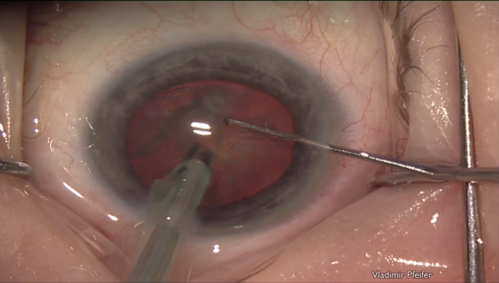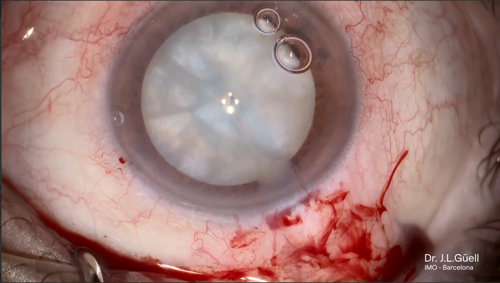ESCRS 100
Library of Short Videos Complements Educational Offerings

Stuart Hales
Published: Friday, March 1, 2024
“ I am sure there are enough tips and tricks out there for an indefinite number of the videos. “
When it comes to videos, less is often more.
That’s the takeaway from a 2018 study of the impact of video length on retention of course material. The study authors found that students who watched short videos reported greater long-term retention of the material they learned than students who watched longer videos.1
ESCRS is taking advantage of these study findings by launching a series of short videos—roughly 100 seconds in length—on topics related to cataract and refractive surgery. More than a dozen videos already have been uploaded to the ESCRS website, and more are added each month.
“The ESCRS 100 videos are intended to show best practice cases and thus serve as a basis for surgical training,” says Dr Alja Crnej, co-leader of the ESCRS 100 project. “In this way, well-founded knowledge can be acquired in a relatively short time using modern media.”
The videos uploaded thus far address topics such as secondary IOL implantation, extracapsular cataract extraction, and single-thread, single-knot sewing machine suture for iridodialysis repair. Submitted videos are categorized in one of the following topics:
- Astigmatic correction in cataract surgery
- Capsular complications and management
- Capsulorhexis
- Cataract surgery after refractive surgery
- Extracapsular cataract extraction
- Hydrodissection and hydrodelineation
- Incision construction
- Irrigation and aspiration
- Mature cataract and capsule dye
- Non-chopping techniques
- Ophthalmic viscosurgical devices
- Phaco chop
- Presbyopia
- Secondary IOL implantation
- Small pupil
- Surgical management of cataract in glaucoma patients
- Sutured intraocular lenses
- Suturing in cataract surgery
- Zonular instability and endocapsular tension rings
“The aim is to focus on specific aspects and deal with a very specific topic,” says Dr Stefan Palkovits, co-chair of the project. “In that regard, we are creating 100-second videos to show and explain a definite step during a procedure or a difficult situation and its solution.”
Intended for all generations
The videos are a project of the ESCRS Education Committee and are intended to share a quick “how to” tip or trick to solve a problem or complication that may arise during surgery. The videos can be used as standalone resources or to complement more formal education initiatives.
“The ESCRS 100 videos can be used as standalone education tools, but in the future, the videos will also become part of a larger ESCRS learning platform, which is currently being developed,” says Dr Crnej. “The ESCRS 100 videos might act as an entry point. The other parts of the learning platform will be linked to make it easier to find further relevant content, such as full videos, lectures, or presentations.”
The videos are intended for surgeons at all stages of their career, although currently, they are not differentiated on the ESCRS website by skill level or years of practice.
“The videos are intended for all ‘generations’ of doctors,” says Dr Palkovits. “When more videos are posted online, we will distinguish those for young doctors from those for more experienced surgeons. But many times, even experienced doctors can learn some valuable information from basic videos.”
Drs Crnej and Palkovits hope the video library continues to grow throughout 2024 and beyond. There is no numerical goal in mind, just a desire to provide as many learning tools as possible.
“We really do hope for a huge library of videos,” says Dr Crnej. “I am sure there are enough tips and tricks out there for an indefinite number of the videos. We just need to keep asking surgeons to share their tips and tricks, since the preparation of the videos is additional work on top of everyone’s busy routine.”

